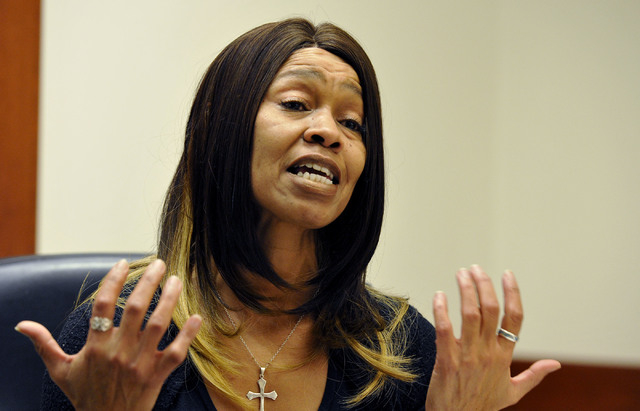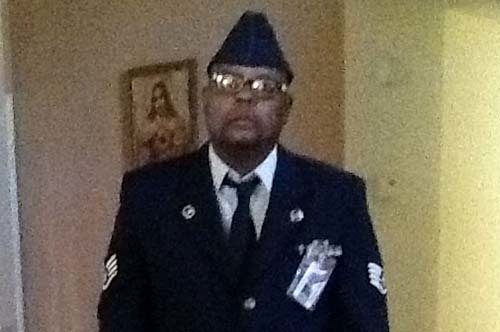Woman says mentally disabled brother being spurned by new VA Medical Center
Thursa Burton’s brother, Rand, is a 100 percent mentally disabled Air Force veteran who is bipolar, diabetic and recently in danger of losing his toes from infection.
Yet instead of being admitted to the Veterans Affairs Medical Center near his home in North Las Vegas where he could get care for his mental and physical problems, the VA has rejected him there, his sister says. She says he has been transferred repeatedly since 2012 from public to private hospitals primarily for his mental health issues but has not been kept for more than a day at the VA Medical Center on Pecos Road.
The 53-year-old former staff sergeant — an administration technician who was released from duty in 1987 at March Air Force Base, Calif., after seven years of honorable service — is at the state’s Rawson-Neal Psychiatric Hospital on Community College Drive.
According to Thursa Burton, the VA mistreated his mental problem with a lithium drug that damaged his brain. “Now they want to wash their hands of him,” she said in a Jan. 28 interview.
“There is so much red tape it’s unbelievable,” she said. “It’s so sad, my brother has been transferred around for two years without getting any mental or medical help from the VA when he’s a veteran. He served this country.”
Thursa Burton is not alone in her description of “red tape” when it comes to dealing with the VA. Those same two words appear on the state’s discharge paper after he spent six months last year at the Southern Nevada Adult Mental Health Services’s Rawson-Neal facility. The document said Rand Burton had been readmitted on Nov. 4, 2012, three days after “the police picked him up after seeing him walking around” when he couldn’t get into his house.
“Arrangements were being made through the VA for the patient’s long term placement,” reads the April 25, 2013, discharge document from a staff psychiatrist.
“It was felt that he was unable to live independently, and he was referred out of state for eventual placement. Due to the VA’s red tape, it was difficult to have the patient placed in time,” according to the discharge paper from Dr. Jacob Manjooran.
A spokesman for the VA Medical Center, Richard Beam, said the VA Southern Nevada Healthcare System, which runs the medical center and VA clinics in the Las Vegas Valley, “is actively working with the state of Nevada in order to accommodate this type of in-patient stay.”
“But currently the infrastructure to meet the state’s requirements are not in place,” Beam wrote in a Feb. 5 email. He said the VA Medical Center doesn’t “yet have the ability to conduct hearings from our facility directly with the courts while the veteran remains in-patient.”
A VA nurse practitioner acknowledged Rand Burton’s “chronic, severe” bipolar disorder in a Dec. 1, 2010, letter. “This is a serious condition which was responsible for his discharge from the service in 1987,” Janet L. Maran wrote.
Maran’s letter was written for consideration when he is “evaluated for legal consequences for actions committed.” She noted that his mania had resulted in two hospitalizations at civilian hospitals and two at O’Callaghan Federal Hospital at Nellis Air Force Base.
As for Rand Burton’s acceptance at the VA Medical Center, Beam said he “has full access to all VA services with the exception of participation in one particular group therapy program. Mr. Burton was found to be too disruptive to his fellow veterans in a group setting and both he and his sister were made aware of this restriction and why. No other restrictions are in place.
“Having said that, Mr. Burton has stated many times to staff ... that he does not want his care provided (by) the VA,” Beam wrote.
Thursa Burton bristled at the VA’s response, saying it was “so not true. My brother is mentally ill. My brother is a veteran. He needs care by the VA.”
Beam reiterated his comment, saying that with the exception of one group therapy session “Mr. Burton has full access to VA care. … but he still has to come to the VA himself to receive that care.”
“Even veterans with mental illness are free to determine if they want their care from the VA,” Beam said.
Thursa Burton said her brother’s problems were exacerbated when the VA went five months without checking lithium levels in his blood. He had been prescribed lithium carbonate, a mood-stabilizing drug for his bipolar condition. He had been taking it for more than 25 years.
It is a dangerous substance which must be closely monitored, the prescription’s label says. Otherwise, after a certain level its toxic effects can cause problems.
On July 8, 2011, the lithium level was so high that he went into a coma for three days. While under the VA’s care, his blood was cleaned of the toxic lithium and his life was saved but not without consequences such as speech impairment and an unstable gait when he walks, she said.
“Ever since that day, my brother has been transferred from one psychiatric hospital to another, none of which are VA hospitals,” she said.
And because Rawson-Neal is a mental facility, he lacked care for his diabetic condition that led to an infection between his toes. He did eventually receive treatment that reduced the infection in early February, Thursa Burton said.
“We need mental and medical help for my brother together at the hospital,” she said. “It’s like the VA abandoned him.”
Beam said, “Given Mr. Burton’s reaction to lithium, giving him more would put him in direct harm.”
Thursa Burton said her brother needs a neuro-psychological exam “so they can find out what additional brain damage he has suffered. And I would like my brother to get on proper psychiatric medication to help him cope.
“I just want him to be back 75 percent of where he was. He’s so gone now that it’s hard. I can’t take care of him myself,” she said.
Contact reporter Keith Rogers at krogers@reviewjournal.com or 702-383-0308. Follow him on Twitter @KeithRogers2.



















